
Anatoly Gitelson, professor in UNL's School of Natural Resources, has retired from the university effective Jan. 31.
"These 14 years feel like one day has passed," said Gitelson, who has been granted emeriti status.
Gitelson credits his working relationship with Don Rundquist, emeritus professor of natural resources, as the reason he made the move from Israel to Lincoln in January 2000.
From 1986 to 2008, Rundquist served as director of the Center for Advanced Land Management Information Technologies (CALMIT) and had an eye for talent in the remote sensing field. He worked tirelessly to recruit Gitelson from Ben-Gurion University in Israel to UNL.
"I'm here because of CALMIT – it's absolutely clear for me," Gitelson said. "I'm not sure that I could have accomplished something comparable to what we did if there were no CALMIT or (Rundquist). In reality, this is a story about CALMIT, not about me."
One of those accomplishments includes the development of a crop model that monitors vegetation health characteristics such as yield, gross primary production and biomass. Gitelson, Rundquist and other researchers used spectral signals to measure and monitor these characteristics in both terrestrial vegetation and surface waters.
The model, first applied on Nebraska corn, is now employed globally – from the rice paddies of China and Japan to the wheat fields of Israel.
"Many, many people all over the world use this technique," Gitelson said. "It's a worldwide application."
In addition to his work on the crop model, Gitelson has published more than 150 peer-reviewed papers. He has also advised nine Ph.D. students and taught a graduate-level remote sensing course offered in the fall.
"I taught 'Quantitative Remote Sensing' (and) it was four hours a week," Gitelson said. "I enjoyed it – but I am not sure the students enjoyed it."
Rundquist said that he always appreciated his frequent scholarly discussions with Gitelson, many of which led to identifying good research ideas that were developed for eventual publication.
"He is a world-class scientist, one possessing amazing energy and enthusiasm for his research," Rundquist said. "He is a tireless seeker of knowledge and has made major contributions to remote sensing with his extensive and widely cited publication record."
When he isn't pursuing his considerable research agenda, Gitelson said he likes listening to music and is an ardent runner. He clocks in 10 to 11 kilometers every other day – averaging the length of a marathon each week.
"I've been doing that for 28 years," Gitelson said. "I couldn't live without that."
Gitelson's philosophy toward long-distance running is akin to his research philosophy: slowing down is not an option. His retirement from UNL may signal the end of one marathon, but considering his plans to continue research at the Israel Institute of Technology in Haifa, there's always one more race left to run.
"I want to go back to Israel not to retire from my work," he said. "I would like to continue my research for as long as possible."
— Mekita Rivas, Natural Resources